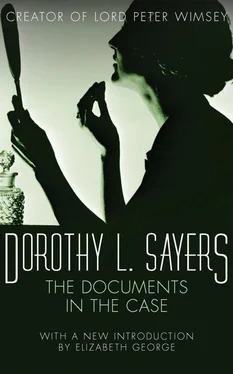‘Yes,’ said Matthews, ‘I thought I saw some odd remarks attributed to you the other day about that.’
‘Wasting my time,’ said Hoskyns. ‘I told them exactly what they put into my mouth. You’re right, Jim, they’d believe anything. The elixir of life — that’s what they really want to get hold of. It would look well in a headline. If you can’t give ’em a simple formula to cure all human ills and explain creation, they say you don’t know your business.’
‘Ah!’ said Perry, with a twinkle of the eye, ‘but if the Church gives them a set of formulae for the same purpose, they say they don’t want formulae or dogmas, but just a loving wistfulness.’
‘You’re not up-to-date enough,’ said Waters. ‘They like their formulae to be red-hot, up-to-the-minute discoveries.’
‘Why, so they are,’ said Perry. ‘Look at Stingo here. He tells them that if two unfit people marry, their unfitness will be visited on their children unto the third and fourth generation, after which they will probably die out through mere degeneration. We’ve been telling them that for three or four thousand years, and Matthews has only just caught up to us. As a matter of fact, you people are on our side. If you tell them the things, they may perhaps come to believe in them.’
‘And possibly act on them, you think?’ said Matthews. ‘But we have to do all the work for them, just as you have to do the godly living.’
‘That’s not altogether true,’ said Perry.
‘Near enough. But we do get on a bit faster, because we can give reasons for things. Show me a germ, and I’ll tell you how to get rid of plague or cholera. Call it Heaven’s judgement for sin, and all you can do is to sit down under it.’
‘But surely,’ struck in the curate, ‘we are expressly warned in Scripture against calling things judgements for sin. How about those eight on whom the Tower of Siloam fell?’
‘If it was anybody’s sin,’ said Perry, ‘it was probably the carelessness of the people who built the tower.’
‘And that’s usually a sin that finds somebody out,’ added Waters. ‘Unfortunately, the sinner isn’t always the victim.’
‘Why should it be?’ said Matthews. ‘Nature does not work by a scheme or poetical justice.’
‘Nor does God,’ said Perry. ‘We suffer for one another, as, indeed, we must, being all members one of another. Can you separate the child from the father, the man from the brute, or even the man from the vegetable cell, Stingo?’
‘No,’ said Matthews. ‘It is you that have tried to keep up that story about Man in the image of God and lord of nature and so on. But trace the chain back and you will find every linkhold — you yourself, compounded from your father and mother by the mechanical chemistry of the chromosomes. Back to your ancestors, back to prehistoric Neanderthal Man and his cousin, Aurignacian. Neanderthal was a mistake, he wouldn’t work properly and died out, but the line goes on back, dropping the misfits, leaving the stabilised forms on the way — back to Arboreal Man, to the common ancestor Tarsius, to the first Mammal, to the ancestral bird-form, back to the Reptiles, the Trilobites, back to the queer, shapeless jellies of life that divide and subdivide eternally in the waters. The things that found some kind of balance with their environment persisted, the things that didn’t, died out; and here and there some freak found its freakishness of advantage and started a new kind of life with a new equilibrium. At what point, Perry, will you place your image of God?’
‘Well,’ said Perry, ‘I should not attempt to deny that Adam was formed of the dust of the earth. And your ape-and-tiger ancestry at least provides me with a scientific authority for original sin. What a mercy the Church stuck to that dogma, in spite of Rousseau and the noble savage. If she hadn’t, you scientists would have forced it back on her, and how silly we should all have looked then.’
‘But it was all guess-work,’ retorted Matthews, ‘unless you call it inspiration, and very inaccurate at that. If the author of Genesis had said that man was made of sea-water, he would have been nearer the truth.’
‘Well,’ said Waters, ‘he put the beginnings of life on the face of the waters, which wasn’t so very far off.’
‘But how did life begin?’ I asked. ‘After all, there is a difference between the Organic and the Inorganic. Or there appears to be.’
‘That’s for Waters to say,’ said Matthews.
‘I can’t be very didactic about that,’ said the chemist. ‘But it appears possible that there was an evolution from Inorganic or Organic through the Colloids. We can’t say much more, and we haven’t — so far — succeeded in producing it in the laboratory. Matthews probably still believes that Mind is a function of Matter, but if he asks me to demonstrate it for him, I must beg to be excused. I can’t even show that Life is a function of Matter.’
‘The Behaviourists seem to think that what looks like Intelligence and Freewill are merely mechanical responses to material stimuli,’ I suggested.
‘That’s all very well,’ said Hoskyns, emerging with a grin from a cloud of tobacco-smoke, ‘but all you people talk so cheerfully about Matter, as if you know what it was. I don’t, and it’s more or less my job to know. Go back again, go past your colloids and your sea-water. Go back to the dust of the earth and the mass of rotating cinders which was before the ocean even began. Go back to the sun, which threw the planets off so unexpectedly, owing to a rare accident which might not happen in a million light-years. Go back to the nebula. Go back to the atom. Do some of the famous splitting we hear so much about. Where is your Matter? It isn’t. It is a series of pushes or pulls or vortices in nothingness. And as for your train of mechanical causation, Matthews, when you come down to it, it resolves itself into a series of purely fortuitous movements of something we can’t define in a medium that doesn’t exist. Even your heredity-business is fortuitous. Why one set of chromosomes more than any other? Your chain of causation would only be a real one if all possible combinations and permutations were worked out in practice. Something is going on, that is as certain as anything can be — that is, I mean, it is the fundamental assumption we are bound to make in order to reason at all — but how it started or why it started is just as mysterious as it was when the first thoughtful savage invented a god to explain it.’
‘Why should it ever have started at all?’ said Matthews. ‘As Matter passes from one form to another, so forces change from one to another. Why should we suppose a beginning — or an end if it comes to that? Why not a perpetually shifting kaleidoscope, going through all its transformations and starting again?’
‘Why, my lad,’ replied Hoskyns, ‘because in that case you will come slap up against the second law of thermodynamics, and that will be the end of you.’
‘Oh!’ said Mr Perry, ‘the formula that starts so charmingly about “Nothing in the statistics of an assemblage” — that appears to be all the Law and the Prophets nowadays.’
‘Yes,’ said Hoskyns. ‘It’s general meaning is that Time only works in one direction, and that when all the permutations and combinations have been run through. Time will stop, because there will be nothing further by which we can distinguish its direction. All the possibilities will have been worked out, all the electrons will have been annihilated, and there will be nothing more for them to do and no radiant energy left for them to do it with. That is why there must be an end. And if an end, presumably a beginning.’
‘And the end is implicit in the beginning?’ said I.
Читать дальше












